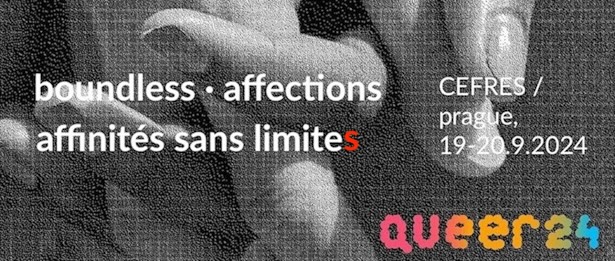Boundless Affections: Methodologies in Transnational History of Same-Sex Desire in Literature (19th-20th centuries)
This international workshop is conceived as a preparatory event for the ICLA Comparative History of Literatures in European Languages Series’ Topic Volume Representing Same-Sex Desire. Local Contexts, Global Circulations in European Literary Cultures. (CHLEL : https://www.uantwerpen.be/en/projects/chlel/).
Date: September 19-20, 2024
Location: CEFRES, Na Florenci 3, Prague and online
Organizers:
- Mateusz Chmurski, Sorbonne-Université / CEFRES
- Clément Dessy, Université libre de Bruxelles
- Hélène Martinelli, École normale supérieure de Lyon / CEFRES
- Ana Isabel Simón-Alegre, Adelphi University
- Josef Šebek, Ústav české literatury a komparatistiky, Filosofická fakulta, Univerzita Karlova
Partners:
- Coordinating Committee for the Comparative History of Literatures in European Languages Series, International Comparative Literature Association (CHLEL-ICLA)
- National Research Fund, Belgium (FNRS)
- Research Centers STRIGES and Philixte, Université libre de Bruxelles (ULB), Belgium
- Adelphi University (New York), United States
- French Research Centre in Humanities and Social Sciences (CEFRES), Prague, Czech Republic
- Department of Czech and Comparative Literature, Charles University (ÚČLK FF UK)
The book project aims to embrace the complexity of same-sex desire representations in European-language literatures: from the late 19th century and the beginning of the modernist movement, which is also a moment when contemporary definitions of homosexuality appeared in different European contexts, until the end of the 20th century, which coincided with the years of AIDS pandemic and the remodeling of these representations. The last decades of the last century were a time of depenalization and theoretical discussions in many Western countries, which paralleled the emergence of new social and historical perspectives, in the gay and lesbian studies, later followed by another conceptual turn, with the development of gender and queer studies.
The choice of a positive definition of same-sex desire as a point of departure prevents us from approaching the question from a social, cultural, and literary point of view, which would be based exclusively on an opposition to heteronormativity. This allows us to observe different local specificities and tendencies in literary representations from a transnational and comparative perspective. Our goal is to observe possible discrepancies between various traditions as well as fruitful dialogues between them, instead of proposing a universalist coming-out model of lesbian, gay and queer literary history set as a progressivist narrative.
Representations of same-sex desire are to be understood in both “aesthetic (mimetic) and political (acting on behalf of) sense of the term” (Couser 2016: 3). This will allow us to focus not only on the circulation of forms, genres, disposals of texts, works, and authors, but also on their potential for identification. This can also help us to determine the patterns of their reception in local and transnational circulations, as well as their interactions with social and political discourses. Here the opposition to various sets of norms – the transgression of which can eventually become to some extent norms themselves – is part of the reflections proposed for this volume.
In the context of this workshop, all analyses must go beyond purely national frameworks, taking into account the diversity and specific context of each country and/or linguistic area. We will focus on discussing theoretical and methodological issues in comparative literature, such as:
- (Dis)continuities: How can we compare the historical representations of same-sex desire in European languages in terms of continuities and changes? How can we avoid essentializing of identities in the process?
- Epistemology: What methods and concepts have already been used to analyze these representations across languages and literatures? Were there studies dedicated to literary representations of same-sex desire prior to the 1970s that paved the way for the establishment fields of investigation, such as gay and lesbian and queer studies?
- Canon / Subcanon(s): How does the emergence of literature exploring diverse sexual orientations and gender identities relate to both European literary traditions and transcultural/transnational perspectives? Can we trace a comparative history of a subcanon of same-sex desire representations in literature?
- Genre: Can we identify a use of specific genres in relation to representations of same-sex desire:
in fiction/non-fiction, drama, poetry, etc.? - Gaze/Style: Does a gay/lesbian/queer gaze exist in the literary treatment of same-sex desire representations? Do these representations use certain tropes and regularities of authorial self-representation, negotiation with (dominant) norms etc. across texts and literatures?
- (De)centering: How might one identify the differences and similarities between peripheral literary developments (such as post-imperial, post-colonial, post-socialist) within different social, cultural, and political contexts marked by oppression under authoritarian or religious power structures, especially in their depictions of same-sex desire?
- Cultural transfers and nationalisms: How can we think about the relationship between nationalism and representations of same-sex desire in literature and other media (e.g. national stereotypes, fear of cosmopolitanism…)? What role have various forms of translation and appropriation of texts representing same-sex desire played on national and transnational levels?
To submit a proposal, please send the following information before May 15, 2024:
a) Your written proposal in English, between 250 to 300 words, including your name, email, and university
b) A brief biography in English, between 200 to 250 words, using the provided Google form: https://forms.gle/jb6oixDphUUVkKqNA
The committee will notify decisions regarding the proposals sent starting from May 30, 2024.
Proposals via email will not be accepted. Partial or integral refund of travel expenses may be available.
For any inquiries, please contact:
- Mateusz Chmurski, mateusz.chmurski@sorbonne-universite.fr
- Clément Dessy, clement.dessy@ulb.be
- Ana Isabel Simón-Alegre, aisimon@adelphi.edu
- Josef Šebek, Josef.Sebek@ff.cuni.cz


